Many countries display their heritage in museums. Portugal's national treasures are colorful, hand-painted tiles – azulejos – that adorn homes, buildings, palaces, churches and even subway stations. Dating from the 15th century, the blue-and-white or multi-colored tiles are a storybook of the country’s artistic provenance from the Renaissance to present day. Depicted are lifelike figures with whimsical smiles, grandiose battles, cloud-puffed skies, galloping stallions, overflowing floral vases, mustached peasants, bountiful catches from the sea and the tile makers' fantasies.

Azulejos are Portugal's Art Treasures
by JudithG
by Judith Glynn. No other country has such fine hand-painted tiles (azulejos) as Portugal. Whether blue and white or colorful scenes, the art form lives on since the 15th century.
Lisbon Landmarks and Their Azulejos
Lisbon and its environs boast the largest azulejo art. In particular, the Museu Nacional do Azulejo has a panorama of Lisbon before the 1755 earthquake. It depicts sailing vessels and the royal palace. The blue, white and yellow “carpet tiles,” imitate Moorish rugs.The on-site café' has 18th-century tiles that that once belonged to a palace kitchen.
The Oceanário de Lisboa, built as part of Expo ’98 on the banks of the Tagus River, has the 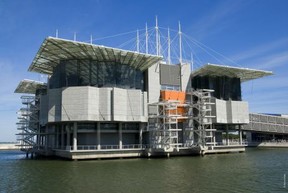 world’s largest mural on a building. “Tiles of the Oceans” covers five stories and 240 feet wide and is made of 54,000, blue-and-white Portuguese tiles hand-painted by 12 women. Renowned architect, Ivan Chermayeff, used computerized images of ocean creatures for the six-inch squares. “From a distance, it’s a photographic image of reef fish,” Chermayeff explained, “but up close it’s a pretty wild abstraction.”
world’s largest mural on a building. “Tiles of the Oceans” covers five stories and 240 feet wide and is made of 54,000, blue-and-white Portuguese tiles hand-painted by 12 women. Renowned architect, Ivan Chermayeff, used computerized images of ocean creatures for the six-inch squares. “From a distance, it’s a photographic image of reef fish,” Chermayeff explained, “but up close it’s a pretty wild abstraction.”
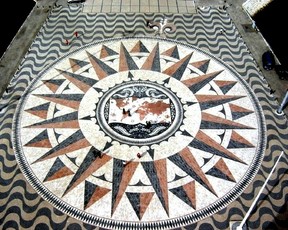
One of Lisbon's largest promenades is the Monument to the Discoveries, which is made of decorative stones. The map of the world shows the routes of the Portuguese navigators. It's best viewed from the top of the monument, which is designed in the shape of a caravel and located on the Lisbon bank of the River Tagus. It honors the 500th anniversary of the death of Prince Henry the Navigator and other notable explorers.
An excellent Lisbon Tile Art Guide is here.
Art in the Lisbon Metro
Modern-day Lisbon boasts commissioned azulejo works at many Metro stations. Maria Helena Vieira da Silva’s “Le Metro” is at the Cidade Universitaria stop.
It's a palette of pastels and earth tones and has the composition of a puzzle. Maria Keil designed tile wall coverings for about 25 years and for 19 stations. She's also responsible for the revival of the Portuguese art form when it declined from the 19th century until the first half of the 20th century. A major installation of Keil's is the mural depicting Portugal’s fishing heritage that's on the walls of a large building complex on Avenida Infante Santo. Manuel Cargaleiro is known for single-picture tiles of modern works in vivid colors and can be viewed at the Colegio Militar station.
Lisbon Subway Station Exit
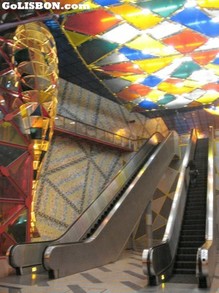 Exit at Lisbon Subway Station www.golisbon.com |
Azulejo Attractions Outside of Lisbon
Sintra
Sintra, west of Lisbon, was the summertime home to Portugal's kings. The Palacio Nacional de Sintra has the richest collection of Spanish-Moorish azulejo art from the end of the 15th and early-16th centuries and the typical blue-and-white tiles of the 18th century. Few spaces were left unadorned with patterns ranging from checkerboard to wine-leaf designs to geometric to floral. Even the courtyard benches are covered in tiles.
Porto
Brazilian immigrants in the 19th century influenced the tiles that decorate Porto, Portugal’s northern city known for its port wine. Estação de S. Bento, has 20,000 tiles depicting transportation and Portuguese history. At the Capela das Almas, the façade of the two-story building is stunning blue-and-white tiles that detail the death of Saint Francis of Assisi and Saint Catherine at her martyrdom. The façade of the Igreja do Carmo, forms the city's most grandiose ceramic panel.
Fabrica Sant'Ana Azulejo Factory
Shopping for Tiles in Lisbon
Shopping for Tiles in Lisbon
Lisbon's Fabrica Viuva Lamego, founded in 1879, sells reproductions of old tiles and the number one place to shop. Solar at Rua Dom Pedro V, 68-70, Barrio Alto has a notable collection of 15th- to 19th-century antique tiles, many from palaces and churches. Ratton, Rua Academia das Ciencias, 2, Sao Bento sells contemporary designs by top Portuguese designer. Other Lisbon shops are equally worthy of a visit and many ship internationally.
You might also like
Mercado de San Antón in Madrid, SpainBy Judith Glynn Chueca is a vibrant, landmark close to Gran Via in Madrid. It...
A Visit to LisbonI spent a lovely few days on a city break in Lisbon, which was a great place ...
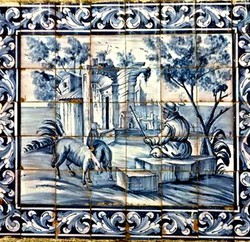

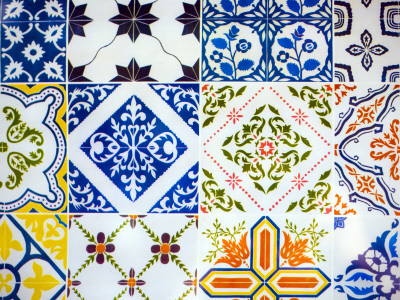
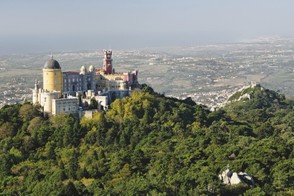







 Czech Film Trips Now an Appon 07/19/2015
Czech Film Trips Now an Appon 07/19/2015
 Dim Sum Dining at 88 Palaceon 01/24/2015
Dim Sum Dining at 88 Palaceon 01/24/2015
 Civil Rights Landmarks in Montgomery, Alabamaon 01/24/2015
Civil Rights Landmarks in Montgomery, Alabamaon 01/24/2015
 Hank Williams Lives On in Montgomery, Alabamaon 08/18/2014
Hank Williams Lives On in Montgomery, Alabamaon 08/18/2014

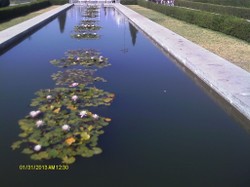
Comments
Wonderful page!
A really good enjoyable page!
Wow this looks amazing. Left to me I would love to travel the world to see the culture and art of the ancient days. It reminds me of temples in India that have beautiful designs and carvings.
Some designs are quite complex. I love seeing azulejos on buildings. My favorite are the dark blue ones.
Hi Jennifer, I've done a lot of traveling and always liked being in Portugal, mostly to look at the tile work. Thanks for your comments.
Fascinating! These tiles do look lovely. Thanks for the introduction.
Hi Katie and Mike, I always appreciate praise. Thanks for yours. I liked the color on these tiles as well.
Nice article and wonderful artwork. Many thanks!
I love the colors of blue, the blue always seems to captivate my attention. Stunning, I love art.
HI Kathleen, Thanks for the praise. Wish I were in Lisbon right now.